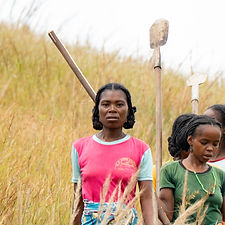We restore endangered ecosystems.
Madagascar Marula Oil
The Fundamentals
The Phoenix Conservancy's Marula oil saves lemurs, full stop.
We give Marula oil presses to rural communities in Madagascar. Then, we buy the oil they produce, providing direct income to impoverished families and incentivizing protection of trees across the landscape.
The revenue we generate by bringing Marula oil to the U.S. supports our reforestation project in Ivohiboro, creating thousands of jobs and growing millions of trees.
Those trees provide habitat to endangered lemurs, and those jobs provide alternative livelihoods that reduce deforestation.
The end result?
Better skin and hair. More rainforest and lemurs.
Thriving communities.

Replenish Yourself.
Restore Rainforest.
Save Lemurs.
Become one of the first 100 people to give $20 or more each month to receive a 2 fl. oz. bottle of Madagascar Marula Oil as a thank you gift* for your support.

*Gift bottle only available in U.S. and Canada.


Skin
Care

Hair
Care
Uses of
Marula

Nail
Care
The Product
Our Marula Oil is 100% raw and cold-pressed from sustainably harvested fruit around Ivohiboro rainforest in southeastern Madagascar. The Oil is light and smooth with a subtle, nutty aroma.
Because of its high protein and anti-oxidant content, Marula Oil offers a multitude of cosmetic benefits, from nourishing hair to moisturizing skin to strengthening nails.
If you become one of the first 100 monthly donors of $20 or more at the fundraiser above, we'll send you a 2 fluid ounce bottle of our Madagascar Marula Oil as a thank you gift for your contribution to our restoration efforts!


Credit: Centre ValBio
Dwarf
Lemur
Cheirogaleus sp.
Undescribed
Meet
The
Lemurs
of Ivohiboro

Ring-tailed
Lemur
Lemur catta
Endangered

Credit: Centre ValBio
Mouse
Lemur
Microcebus sp.
Undescribed

Marula
Sclerocarya birrea
Native to Madagascar and much of southern Africa, Marula trees are drought tolerant, fire resistant, and grow quickly, making them a key species in our Foxhole Forest restoration strategy. Marula trees can rapidly develop a protective canopy that lowers temperatures and increases water retention in their understories, allowing other forest species to survive and grow in the otherwise inhospitable conditions of open grassland.
Marula fruits are most analogous to small mangos; a thin, fleshy exterior surrounds a woody nut that contains oil-rich seed kernels. A single, mature tree produces 1,000 pounds of fruit each year, providing an abundant yet scarcely utilized resource in a region with an average annual income of just $100 for entire families.

Foxhole Forest
Restoration Sites

Firebreak
Protection
Surrounding Ivohiboro
Your
Dollars
In Action

Local
Jobs
Uplifting Communities
Why?
Dire economic conditions are the root of Madagascar’s ecological degradation, inhibiting the restoration activities necessary to buffer the country from and adapt to climate change. Without economic systems that incentivize restoration, Madagascar’s already precarious state will devolve into catastrophe.
Marula trees offer an opportunity to transition grassland to forest while providing a self-perpetuating system that ensures long-term restoration and socioeconomic development.

The
Process
Supporting rainforest, lemurs, and communities through restoration
1
Oil Production
Community organizations extract cold-pressed Marula oil from the fruit's seed kernels.
1
2
Community
Income
We buy Marula oil directly from communities to provide immediate livelihood support.
2
3
Rainforest
Restoration
We use Marula oil funds to restore rainforest by hiring thousands of community members to plant trees and build firebreaks around Ivohiboro.

How to Help
You can join our Marula Oil Fundraiser using the form at the top of this page to directly support our efforts to restore rainforest, save lemurs, and empower local communities by connecting them to global cosmetic markets.
If you aren't able to give monthly but would still like to make a contribution, you can make a one-time donation at our Donate page.
Tell us about your experience with Marula Oil! Use #MadagascarMarula and tag us on social media to spread the word and keep us updated.
If you missed this gift opportunity, don't worry! Follow us on social media and sign up for our newsletter to find out when we're restocked on Marula Oil.
Our progress on the Marula Project is entirely due to the generous financial support of the IUCN SOS Program, the Stockel Family Foundation, the Brabson Family Foundation, the Rufford Foundation, the New Earth Foundation, the Butler Family Foundation, and numerous individual donors. To everyone who has contributed to our efforts, thank you!






